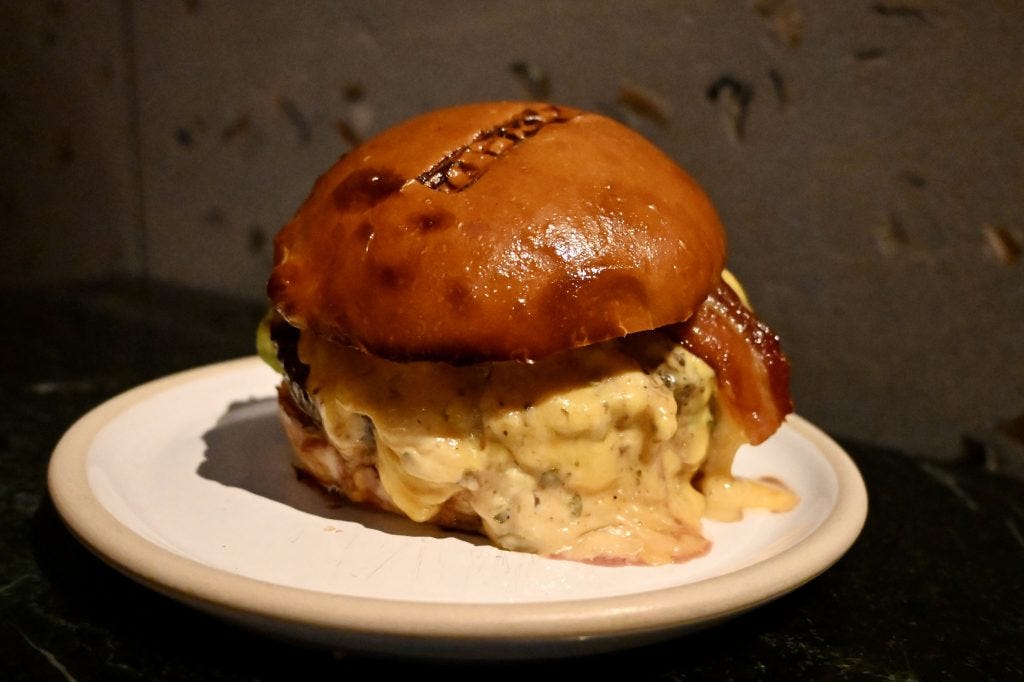Good morning to all of you beautiful Supper Club members. Welcome to the best part of your week. It’s Monday morning, and there’s an unopened email from Served sitting at the top of your inbox. I know the anticipation is just killing you.
This week’s newsletter comes from our often-mentioned, rarely heard from technical guru - Grant. While I’ve been standing up the weekly email that takes you with us on our adventure through the New York City dining scene, Grant has been building technical infrastructure to house and host all of the data points that we’ve picked up along the way. At every stop on the chain of waiters’ favorite restaurants, we’ve gotten more recommendations than we’ve shared with you. This piece will give you a glimpse into how that data will speak to, and complement the written content. We’re building an ecosystem here, people.
Next week, we’re going back to Red Hook to try Grindhaus per a recommendation from Barry at The Good Fork Pub. I can’t wait to tell you about it. For now though, I’ll pass the mic to Grant.
Hey it’s Grant, the guy who wants to write Nerd Notes. Like Will mentioned above, I’m building some tech that will let you interact with our entire dataset of restaurants. Not just the ones we write about. The thesis for why we think this format might be interesting revolves around Google and some late-night conversations in a college dorm.
Oddly enough, Served Supper Club started out as a project in an undergrad computer science course. Back at Penn in the spring of 2019, my friend Brandon and I were in a class called NETS150: Market and Social Systems on the Internet. Here is an excerpt from the course description:
“Want to understand the sociological and algorithmic aspects of friend recommendation? Want to know how Google decides what 10 answers to return, out of the 10 million matching results? Want to understand how search engines have revolutionized advertising? Then this is the course for you! ”
A section of this class was devoted to learning about the algorithm that was at the core of Google’s founding: PageRank. This algorithm was developed by Google co-founders, Larry Page and Sergey Brin during their graduate research at Stanford University. In short, “PageRank works by counting the number and quality of links to a page to determine a rough estimate of how important the website is. The underlying assumption is that more important websites are likely to receive more links from other websites.”
Imagine the internet as a web, or graph, of websites (nodes) and links (edges) between those websites. Say usa.gov has links out to 10 other websites, and 100 websites link into usa.gov. Say there is another website, jane.com, that has links out to 100 websites, but there are zero websites that link into jane.com.
The PageRank algorithm will tell us that usa.gov is a more “reputable” source than jane.com since it has so many websites pointing to it. The algorithm’s output will also say that all sites that usa.gov links TO will gain some reputation points since a reputable website points to them. For example, if usa.gov is referring via link to fbi.gov, then fbi.gov gains some reputation points by being a source of information for usa.gov.
As we were thinking about final project ideas, I wanted to do something in the restaurant space, so I immediately went to my resident-foodie friend, Will (who you all probably know by now). He came up with an idea where we could treat restaurants in Philadelphia as our “websites,” and then ask the chef of those restaurants for their favorite restaurants in Philadelphia. Those recommendations would become our “links.” If the chef of a reputable restaurant recommends these other restaurants, then we could assume that the restaurants must be pretty darn good. Our culinary search engine would also solve for credibility issues that are endemic to recommendations made by Yelp or Google Maps. These platforms are built by aggregating the opinions of completely random people. We wanted to seed our engine with people who really know good food. Helping you discover “your favorite restaurants’ favorite restaurants.”
We ended up running into a lot of problems here because chefs are generally pretty impossible to reach. We ended up collecting only a few recommendations, normally from the manager who answered the phone - or the few chefs on LinkedIn/Instagram/Twitter who responded. Against all odds, we were able to make a little command line app that spat out recommendations based on what we were looking to eat (Italian, seafood, etc.) and the rankings created by this “Chef-Graph” of Philly. Although it wasn’t perfect, there were still some banger recommendations in there: Vernick, Friday Saturday Sunday, Palizzi Social Club - to name a few. After the course we briefly discussed doing it for real, but there wasn’t much momentum from our initial test. Life also has a tendency of getting in the way.
Fast forward to the fall of 2022. My girlfriend and I were in London visiting one of our friends. We were wandering around aimlessly, trying to find a good hamburger on our last night there. I was scouring the internet for recommendations using the usual Eater -> Infatuation -> Google Maps pipeline when I found a place called BlackLock that we were within walking distance from. When I spoke to the host, he was flabbergasted that I even thought about getting in without a reservation as they are booked up for months in advance. “Look, I’m sorry we can’t seat you here. But, my personal favorite burger is just down the road at a place called Fallow. Give that a try, they will definitely have bar seating for you.”
Right then and there I realized we had a solution to the Chef-Not-Answering problem. We were over-indexing on one person, when in reality anyone who lives, eats, and breathes the restaurant industry will have more valid recommendations than random people on the internet.
Fallow was fantastic. Phenomenal burger, and they even had this creative wild-mushroom infused butter that was a hit as our appetizer. I immediately reached out to Will, asking if he’d be down to give this another shot. Instead of focusing exclusively on the chefs, we now highlight the people who make or break your experience no matter how good the food: waiters. Thus, Served Supper Club was born and made to creatively map the restaurant scene in New York City. We hope to offer you an alternative to pretentious food critics, and negative reviewers across NYC. Your favorite restaurants’, favorite restaurants. As we continue to meet waiters, I’ll be building out some exciting technical features to make Served even better.
Soon, you’ll be able to pick and choose from our waiter-approved restaurants and easily share them with your friends. We’ve also got some possible events in the works and are shooting to host our first by the end of April 2023. Thanks for reading, and I’m excited to show you all what we’ve been working on in the months to come.
Served,
The Supper Club









